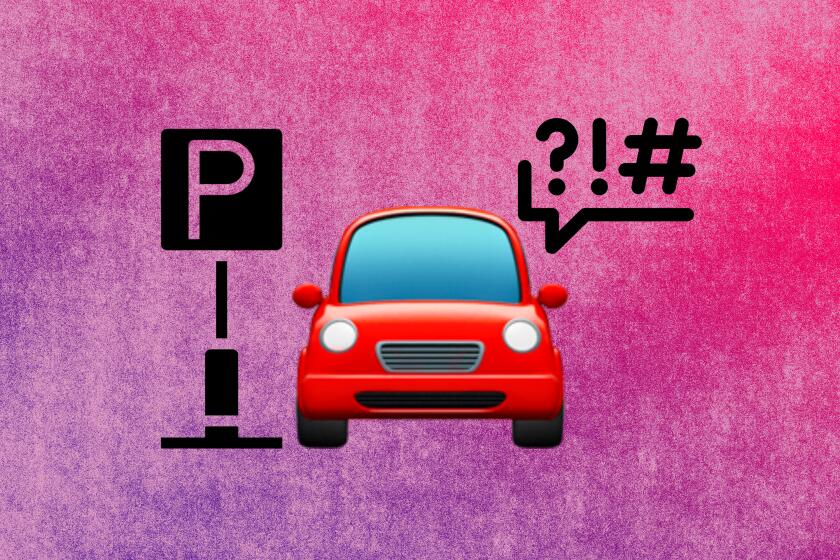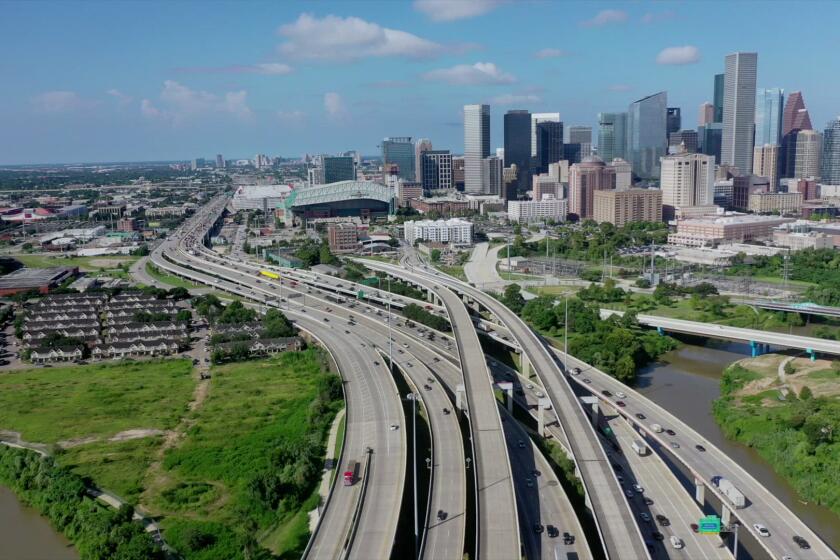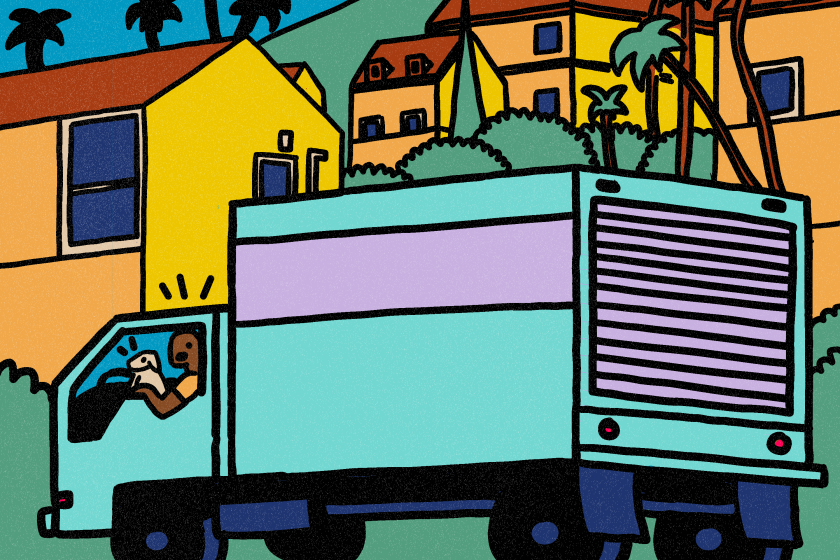Towed or booted in L.A.? How to get your wheels back
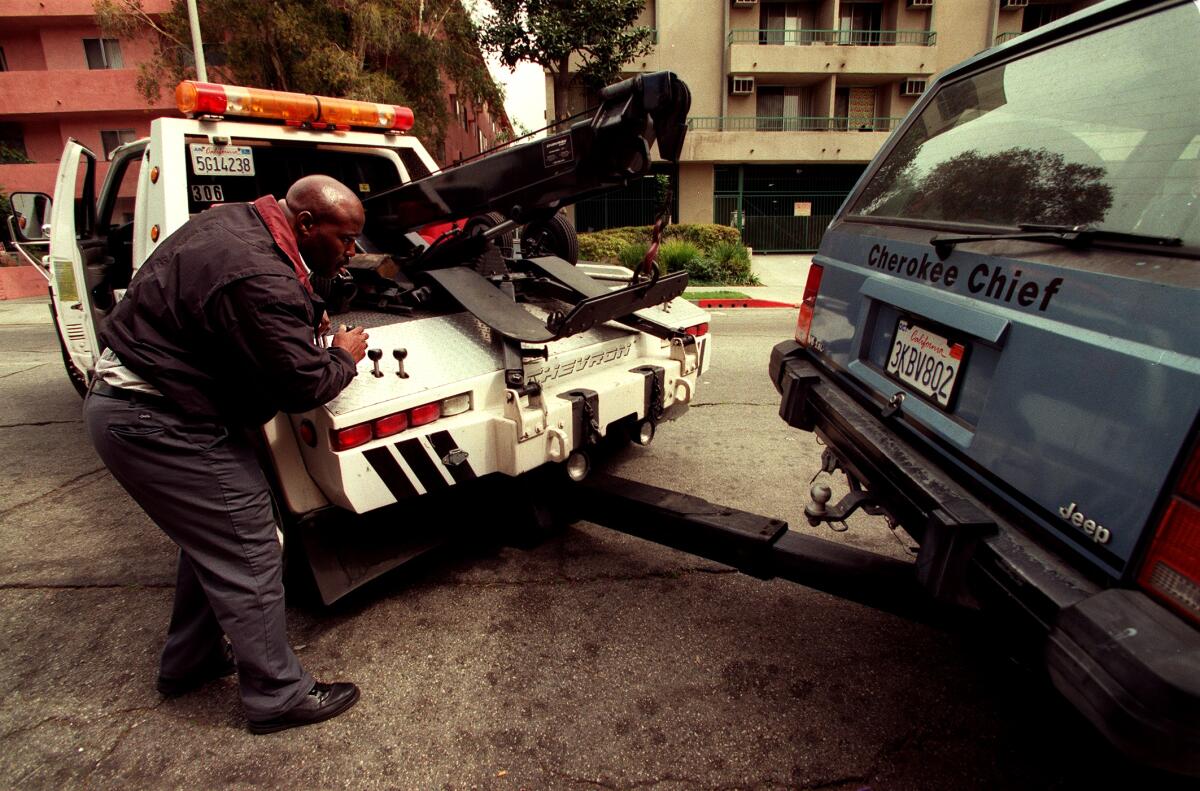
- Share via
You’ve just left the grocery store, bags in hand. You’re glancing around the parking lot, and you ask yourself: “Dude, where’s my car?”
Well, “dude,” your car is sitting in an impound lot because you were towed.
Your vehicle can be towed or booted in the city of Los Angeles for a multitude of reasons. The most common are that you left your car in a no-parking zone, you parked on private property or you have outstanding traffic infractions that haven’t been paid off.
Booted? Here’s what to do
If you have five or more unpaid, overdue parking citations, your vehicle may be booted. That means a locking device will be put on one of your wheels, preventing you from moving the vehicle. You’ll have to get the boot removed before you can drive your car again. (Seriously, don’t try to drive with the boot on.)
When your vehicle is booted in the city of Los Angeles, you’ll have to pay not only the overdue citations but also a $150 removal fee.
There are two ways you can get a boot released. You can call the 24-hour Boot Release line at (855) 288-2642 and pay off all fees with a credit card. Once the transaction has been approved the release line will provide you with a code to remove the boot.
Parking in Los Angeles is about luck and skill. So save time and money by learning these hacks with yellow curbs, green curbs, holiday rules, valet and more.
But the city needs the boot back within 24 hours. You can return it yourself to one of the following locations:
- Superfine Valero
500 S. Alameda St.
Los Angeles, 90013
Hours: 6 a.m. to 8 p.m., seven days a week
- Victory Auto Service Center
13736 Victory Blvd.
Van Nuys, 91401
Hours: 8 a.m. to 6 p.m., Monday through Friday; 8 a.m. to 2 p.m. Saturday
- David’s Service Station/American Gasoline
1404 W. Martin Luther King Jr. Blvd.
Los Angeles, 90062
Hours: 9 a.m. to 5:30 p.m., Monday through Friday; 9 a.m. to 1 p.m. Saturday
- US 24/7 Postal Center
9887 W. National Blvd.
Los Angeles, 90034
Hours: 9 a.m. to 6 p.m., Monday through Friday; 10 a.m. to 3 p.m. Saturday
Alternatively, you can call the release line and ask that a traffic officer be sent to pick it up. But there are dispatchers on the line only from 6 a.m. to 5:30 p.m., with requests after 3 p.m. not guaranteed.
If you’d prefer to pay in person rather than over the phone, you can do so at an L.A. Department of Transportation public service center — there’s one each in downtown L.A., Mid-Wilshire, Van Nuys and West L.A., open weekdays from 9 a.m. to 5 p.m. Once you’ve paid up, you can call the release line to arrange getting the boot removed.
You have to pay all fines within 48 hours of the boot being applied or you’ll face more fines.
Some of the country’s largest recent highway expansions have inflicted another round of displacement in largely Black and Latino communities.
You’ve been towed. Now what?
Two entities can tow you: the police or a private towing company.
The police can tow your vehicle for several reasons, including when:
- You commit a handicap parking spot violation.
- You, the driver, are arrested.
- You park and block traffic.
- You are in a car accident.
- Your vehicle’s registration is expired.
- You drive without a license.
- You have five or more outstanding traffic violations that haven’t been paid.
- You sell cars without a proper business license.
A private tow company can be called to remove your car because you:
- Are blocking an entrance or an exit.
- Are illegally parked in a handicap spot.
- Are parked in a fire lane.
- Are within 15 feet of a fire hydrant.
- Are parked in a resident-only spot.
- Took a spot designated only for motel or hotel guests.
- Parked for more than one hour in a designated one-hour zone.
- Parked for more than 24 hours in a designated 24-hour zone.
If you are given a ticket for any of the above infractions, and if within 96 hours it’s not addressed, your vehicle can be towed by a private company.
Once you realize you’ve been towed and didn’t just forget where you parked, the next step should be to call the local police department. Although the contact information of the private tow company being used must be clearly posted on a sign, they are required to alert local law enforcement within 30 minutes of your tow.
So either way, the police are a good place to start.
If you happen upon your vehicle being hooked to the truck, and it hasn’t left the property yet, the driver must release your vehicle to you. Of course, this comes at a price. According to state law, the drop fee cannot exceed the half the rate for towing the vehicle. Each city sets its own rate. In Los Angeles, the average rate is $125, meaning you can’t be charged more than $62.50 by the tow company to release your vehicle.
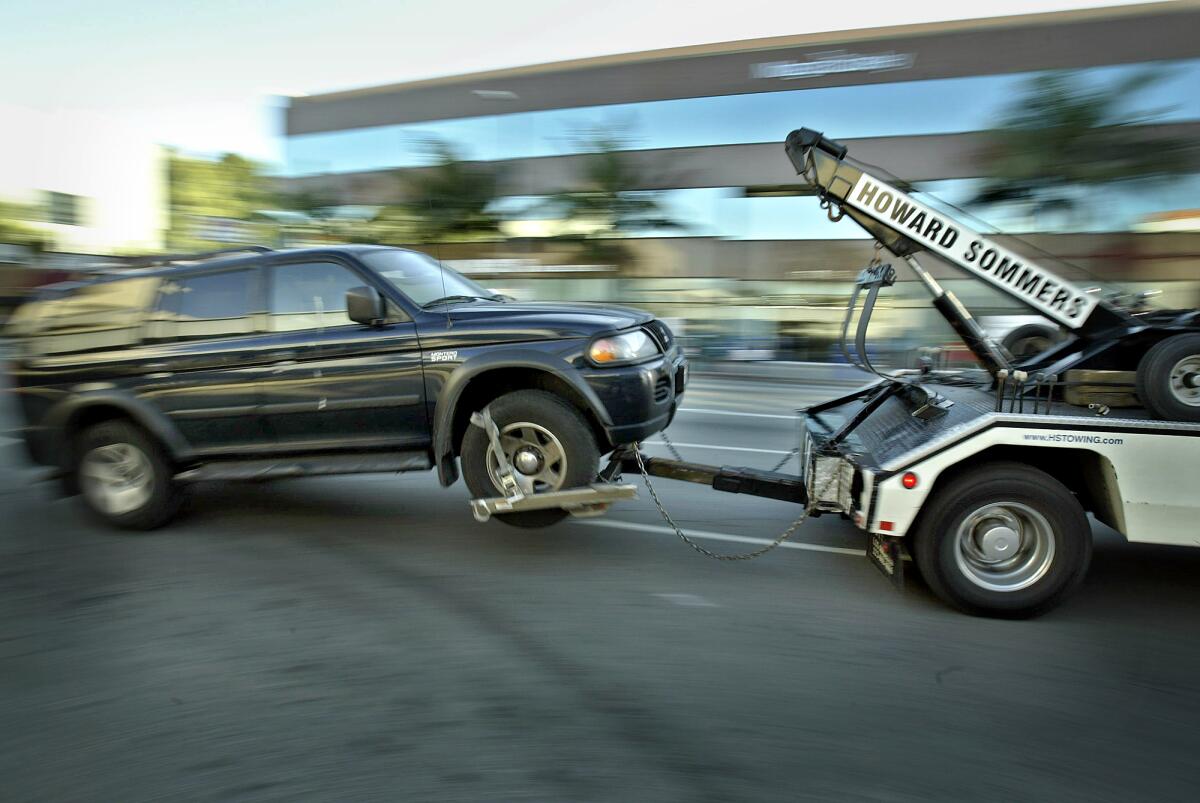
If your vehicle is towed in Los Angeles by the police, you must visit one of the Public Service Centers and pay the fines for all your outstanding violations. Once that’s done, you will be told which one of the official police garages your vehicle is being held in. You also have to pay for the towing service and the storing of your vehicle at the official garage when you pick it up. Fees are dependent on how long your vehicle is held and can add up quickly.
Let’s say you were parked in a spot for 73 hours — just past a posted 72-hour cutoff. Here’s what you’re on the hook for:
- The hour that you went over the posted limit will cost you $139.50 with a credit card, $136.50 in cash. (For every hour thereafter, you’d be charged an additional $69.50 for card payments, $68.00 for cash.)
- The number of days your car is impounded — $43.50 per day with card, or $42.50 cash.
- Getting your car released: The city of Los Angeles, for example, charges $115.
- These fees — and more — are on top of the total costs of any outstanding parking violations.
There are a few more important things to know about being towed:
- Neither the police nor private citizens, such as business owners, are required to notify you before they have your vehicle towed.
- When towed, your vehicle cannot be taken more than 10 miles from its origin unless authorized by the police.
- Private tow yards must provide access to a pay phone and remain open Monday through Friday, 8 a.m. to 5 p.m. After-hours and holiday releases must be performed, but they are permitted to charge an extra “gate fee” for the inconvenience.
- All fees must be paid within 30 days of your vehicle being towed. If you do not make your payments by then, your car may be put up for sale, but only after you’ve been mailed a certified letter alerting you to the sale and giving you 10 days to oppose it. The amount collected after the sale of your vehicle will be put toward paying off your fees. But if the amount doesn’t cover it all, you’ll have to pay the rest.
The registered owner of the towed vehicle is responsible for all fees and must provide the following upon pickup:
- A vehicle release order from the public service center (obtained upon payment of outstanding tickets).
- Proof of registration of the vehicle.
- A valid form of ID.
- A form of payment for towing and storage charges (no personal checks).
The easiest way to release your vehicle from tow yard prison is to go there yourself. If you want to send someone to pick it up for you, you’ll need to equip that person not just with the release order, proof of registration, a copy of your valid ID and a form of payment, but also a letter authorizing them to pick up your vehicle.
Colin Sweeney, public information director for LADOT, said getting the letter notarized helps to ensure that the person picking up the vehicle is accepted by the garage as authorized to do so.
The city’s parking problems go back over 100 years. And by 2015, a study found, 14%, of L.A. County’s incorporated land was devoted to parking.
Is there any way to get your money back?
There is a way you can fight the fees. If you believe you were wrongfully booted or towed, you can request a hearing. You’ll need to schedule an appointment at one of the LADOT’s public service centers. Your hearing will occur within two business days of the request.
Even if you feel you were wrongfully booted, you still need to pay the fees within 48 hours. It’s the same with towing: Pay your fees to avoid more.
When it’s time for your hearing, Sweeney said, bring all important documentation, including:
- All documentation to show that you are the owner of the vehicle.
- A color copy of a valid and verifiable state or federal photo ID.
- Your signed tow receipt from the impoundment yard. (If paid by debit or credit card, you must print the itemized receipt separately from the full-page invoice.)
There are three ways the hearing officer can rule:
- You, in fact, deserved to be booted or towed.
- The city finds that you shouldn’t have been booted, but you failed to properly complete a transfer of ownership and are not considered liable for more than five traffic infractions. In that case, you won’t have to pay for the citations but you’re still stuck with the $150 fee to get the boot removed or the fees to get your car out of impound.
- The city made an error and your vehicle shouldn’t have been booted or towed.
If your vehicle is found to have been towed or booted in error, Sweeney said, there are ways to get your money back:
- Remember those receipts you’re supposed to bring to your hearing? Those will help determine how much money you and the police garage are owed if your vehicle was towed. Any refund owed due to a city error is distributed in the form of a check. Checks are usually distributed within 30 days of the ruling.
- If the boot was wrongfully applied and no reasonable grounds are found, the office manager of the Adjudication Division would arrange for it to be removed and you wouldn’t have to pay the $150 boot fee.
- If you’re seeking reimbursement for any other related charges like administrative and miscellaneous fees, he said, you have to file a claim with the city clerk.
If you’re like most people in Southern California, you live in a rental.
More to Read
Sign up for Essential California
The most important California stories and recommendations in your inbox every morning.
You may occasionally receive promotional content from the Los Angeles Times.
